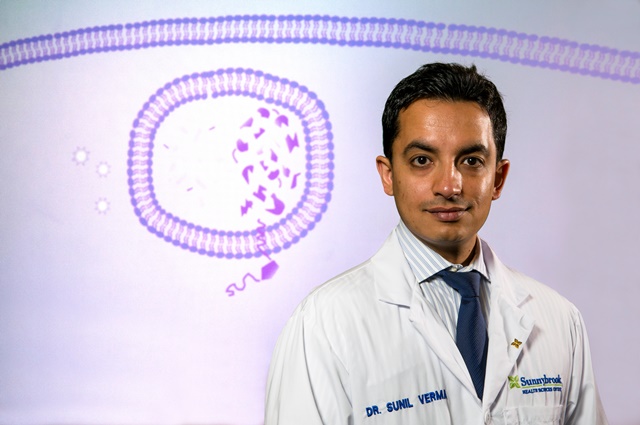
“You feel invincible when you’re young and then all of a sudden, you have this wake-up call,” says Delaney Janhunen. Delaney was 36 when she was diagnosed with HER2-positive breast cancer. Three years later, the cancer had recurred in lymph nodes under her arm.
Referred to Sunnybrook’s Odette Cancer Centre and medical oncologist, Dr. Sunil Verma, Delaney joined a global clinical trial at the Centre to examine the effectiveness of an antibody-drug conjugate, a new way to attach chemotherapy to targeted therapy. The approach harnesses the benefits of targeted therapy (aimed at cancer cells), and allows chemotherapy to be carried directly to cancer cells.
Patients are living longer, thanks to earlier detection and better treatments. Treatments are more tailored for the individual, resulting in reduced side effects and improved quality of life. Care teams at the Odette Cancer Centre provide patients with advice on current standard treatment options, and is one of only a few centres in Canada with the expertise to provide the latest in tailored treatment research and clinical trials, including Stereotactic Body Radiotherapy (SBRT) multi-visceral laparoscopic surgery, and novel drug therapies, for example, designed to overcome cancer resistance or to directly target the key drivers of cancer cell growth.
Stereotactic Body Radiotherapy
SBRT is a newer technique that allows a very high dose of radiation to a focused area, over a few treatments. It used to treat some well-defined tumours of the lung, liver, bone/spine and brain, and is being investigated as potential primary treatment for prostate and kidney cancers. The goal of SBRT is to eradicate the treated tumour, making it another effective option for patients who cannot have, or choose not to have surgery.
MORE: IT’S TIME TO START USING THE M-WORD
Dr. Patrick Cheung, radiation oncologist, Odette Thoracic and Genitourinary Cancer care teams, is also studying SBRT for patients like Louise McGarry, who have oligometastases (less than five tumours).
In 2013, Louise, 47, had SBRT to treat a tumour in her lung and another lymph node tumour in her abdomen. Recalls Louise, “I thought – since I had the choice of something less invasive especially with the added difficulty of where the tumour was, it was an easy decision – let’s just do it!” She was diagnosed a year before with colorectal cancer, with a large tumour in the colon. The cancer had also spread to the liver, lung and lymph nodes behind the lining of the abdomen and abdominal organs. Treatment began with radiation therapy and oral chemotherapy to shrink the colon tumour. She underwent surgery to remove it and the liver tumour. “Things happen for a reason,” she says. “You need to accept that you may never know what the reason is. This journey’s been a blip in my life. I choose to fight and move forward. I know I have the strength and the support to deal with it.”
Multi-visceral Laparoscopic Resection
Ellen Skok, 88, had a novel surgical procedure called laparoscopic multivisceral resection for colon cancer. In most cancer centres, multivisceral resections with traditional incisions are already being performed and consist of removal of multiple organs altogether in order to resect a colon or rectal cancer completely. Sunnybrook’s Odette Cancer Centre is one of only a handful of centres worldwide, with the expertise to perform these multivisceral/multiple organs removals laparoscopically. “Without compromising oncologic principles of ensuring removal of the whole cancer, we can now offer this complex procedure to selected patients who can benefit from laparoscopic surgery despite a massive tumour invading other organs,” says Dr. Shady Ashamalla, a surgical oncologist of the Odette Gastrointestinal Cancer care team, who performed Ellen’s surgery, and who completed advanced training at the University of Toronto, in both Minimally Invasive Surgery and Surgical Oncology.
MORE: PLAIN LANGUAGE LABELLING INITIATIVE LONG OVERDUE
Ellen’s procedure included laparoscopic removal of a large cancer in the colon and invading into adjacent tissues and organs, including abdominal muscles, and part of the liver and kidney. “There was no incision,” she says. ”Two weeks after the surgery, I went out to have dinner, and people couldn’t believe it! My recovery was very rapid. I am able to do everything I’ve always done: my own housework, laundry, and tidying my apartment which is not large – but not small either!”
Novel Targeted Therapies
Medical oncologists are exploring new approaches in immunotherapy for lung cancer and melanoma, targeting specific proteins so cancer cells cannot escape detection by the body’s immune system.
Results of the Phase III clinical trial known as EMILIA, that Delaney Janhunen participated in, shows improved survival with significant reduced toxicity for women with advanced HER2 positive breast cancer.
“The longer-term hope is that this framework will be used for other cancers and at earlier stages of disease,” says Dr. Verma, chair, Sunnybrook Odette breast medical oncology, and head, Breast Clinical Trials.
Says Delaney, who now has no detectable cancer, “I’m very blessed to be maintaining close to a normal life.”

